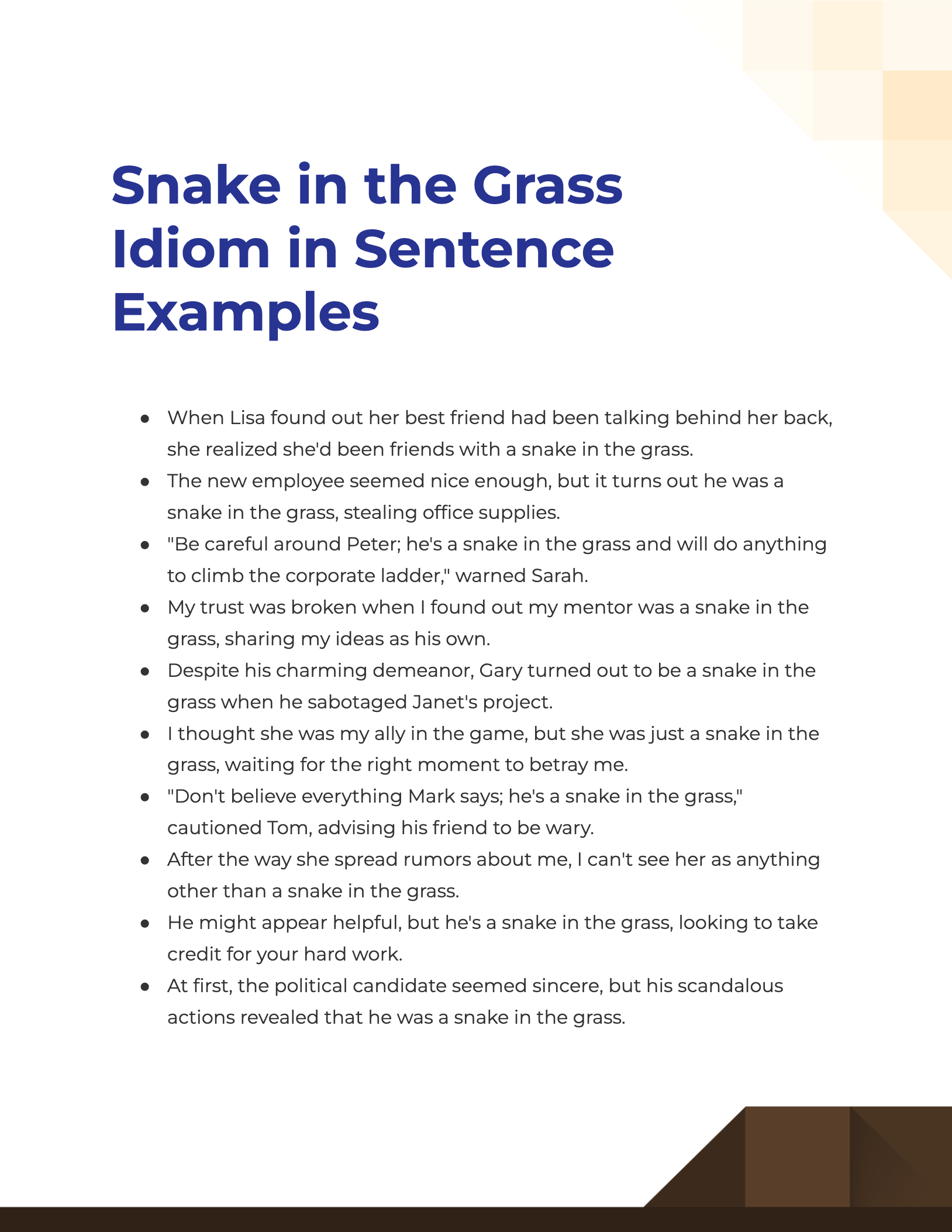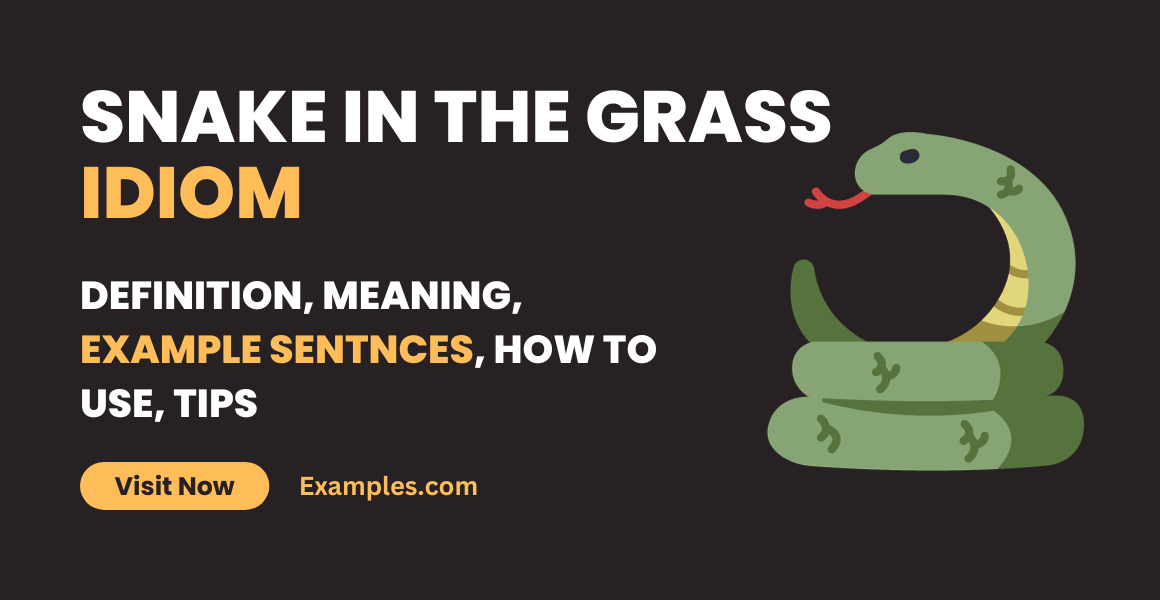Snake in the Grass Idiom
Discover the intriguing world of idioms with our detailed guide on “Snake in the Grass.” This phrase isn’t just a saying; it’s a cautionary idiom that uncovers the hidden dangers lurking in seemingly safe environments. Learn its meaning, usage, and compelling sentence idiom examples to enrich your language skills and perception.
What is Snake in the Grass Idiom? – Definition
The idiom “Snake in the Grass” refers to a person who appears harmless but is secretly deceitful or treacherous. In simple English, it’s a way to describe someone you can’t trust because they have hidden bad intentions.
What is the Meaning of Snake in the Grass Idiom?
When you say someone is a “Snake in the Grass,” you’re essentially warning others that the individual in question is not as innocent or trustworthy as they appear. The idiom often serves to alert people about someone who may betray or harm them when least expected, even though they may outwardly seem friendly or trustworthy.
Origin of Snake in the Grass Idiom
The expression “Snake in the Grass” dates back to ancient times, often attributed to the Roman poet Virgil who used it in his works. The idiom draws its imagery from the literal idea of a snake hiding in tall grass, poised to strike unexpectedly. Over centuries, it has been adapted into English and other languages, serving as a metaphor for hidden dangers, especially those posed by untrustworthy individuals.
20 Best Sentence Examples with Snake in the Grass Idiom

- When Lisa found out her best friend had been talking behind her back, she realized she’d been friends with a snake in the grass.
- The new employee seemed nice enough, but it turns out he was a snake in the grass, stealing office supplies.
- “Be careful around Peter; he’s a snake in the grass and will do anything to climb the corporate ladder,” warned Sarah.
- My trust was broken when I found out my mentor was a snake in the grass, sharing my ideas as his own.
- Despite his charming demeanor, Gary turned out to be a snake in the grass when he sabotaged Janet’s project.
- I thought she was my ally in the game, but she was just a snake in the grass, waiting for the right moment to betray me.
- “Don’t believe everything Mark says; he’s a snake in the grass,” cautioned Tom, advising his friend to be wary.
- After the way she spread rumors about me, I can’t see her as anything other than a snake in the grass.
- He might appear helpful, but he’s a snake in the grass, looking to take credit for your hard work.
- At first, the political candidate seemed sincere, but his scandalous actions revealed that he was a snake in the grass.
- Everyone thought the company’s CEO was committed to sustainability, but he turned out to be a snake in the grass, cutting corners wherever possible.
- Even though he volunteers at the local shelter, he’s a snake in the grass, only doing it to build a good public image.
- My brother warned me that my new roommate could be a snake in the grass, always borrowing money and never paying it back.
- The coach thought he had a dedicated team, but one player turned out to be a snake in the grass, leaking strategies to their rivals.
- The investor seemed keen on supporting the startup, but was actually a snake in the grass, intending to steal the business idea.
- Her friendly smile concealed her true nature; she was a snake in the grass, waiting for the opportunity to spread gossip.
- Our neighbor pretended to be concerned about our security, but he was just a snake in the grass, trying to find out when we weren’t home.
- “Trust me, don’t partner with him on the project; he’s a snake in the grass,” advised Emily, who had learned the hard way.
- The con artist, a real snake in the grass, posed as a charity worker to swindle people out of their money.
- Julie thought her study group was supportive until she discovered a snake in the grass who told the teacher she had plagiarized her work.
More Famous Idioms with Meaning, Sentence Examples
- Play It by Ear Idiom
- In Black and White Idiom
- Crocodile Tears Idiom
- Full of Beans Idiom
- Busy as a Bee Idiom
- Once in a blue moon
- Break a leg Idiom
- Beat around the bush Idiom
- Bite the bullet Idiom
- Through thick and thin Idiom
- Actions speak louder than words Idiom
- Go down in flames Idiom
- Jump on the bandwagon Idiom
- Call it a day Idiom
- It takes two to tango Idiom
- A blessing in disguise Idiom
- Come rain or shine Idiom
- On cloud nine Idiom
- Better late than never Idiom
- Hit the sack Idiom
- Go the extra mile Idiom
- The Whole Nine Yards Idiom
- A penny for your thoughts Idiom
- Pull someone’s leg Idiom
- As right as rain Idiom
- Ignorance is bliss Idiom
- Throw caution to the wind Idiom
- Kick the bucket Idiom
- Take a rain check Idiom
How to Use Snake in the Grass Idiom in Sentences?
The idiom “Snake in the Grass” can be a powerful tool for adding emphasis and drama in both written and spoken English. But how do you incorporate this expression seamlessly into your sentences? Below are some guidelines to help you master the usage of this idiom.
Identify the Context
First, it’s crucial to understand the context in which you want to use the idiom. The expression is generally employed to describe an individual who is deceitful, treacherous, or not to be trusted.
Subject Placement
The subject—usually the person who is untrustworthy—typically comes before the idiom. For example:
- “John is a snake in the grass.”
As a Warning
You can use the phrase as a cautionary warning to someone:
- “Be careful of Helen; she’s a snake in the grass.”
In Past Tense
You can use the idiom in the past tense to describe a situation or a person from before:
- “I thought she was honest, but she turned out to be a snake in the grass.”
In Questions
It can also be used in questions to probe someone’s trustworthiness:
- “Do you think he could be a snake in the grass?”
Add Supportive Details
For extra impact, you can accompany the idiom with additional information that describes why the person is not to be trusted:
- “I wouldn’t trust her with sensitive information; she’s a real snake in the grass.”
Tips for Using Snake in the Grass Idiom
Understanding how to use the idiom is one thing, but using it effectively requires some additional considerations.
Use Sparingly
As with any idiom, it’s best not to overuse it. Frequent repetition can lessen the impact of the phrase.
Maintain the Correct Tone
Since the idiom carries a negative implication, make sure it aligns with the overall tone of your conversation or writing. It’s not suitable for light or comedic contexts.
Pair with Descriptive Language
To make your point more impactful, consider adding descriptive words or phrases that further elucidate the person’s deceptive nature:
- “He’s not just a snake in the grass; he’s a master of manipulation.”
Consider Your Audience
While the idiom is widely understood, there could be cultural or language barriers for some. Make sure your audience is familiar with the phrase to avoid any confusion.
Alternate Phrases
If you’ve already used “Snake in the Grass” and want to avoid repetition, consider similar idioms like “Wolf in sheep’s clothing” or simply use straightforward language to describe the person’s untrustworthiness.
By following these tips and guidelines, you can use the “Snake in the Grass” idiom to effectively highlight deceit and treachery, making your speech or writing more compelling and nuanced.



